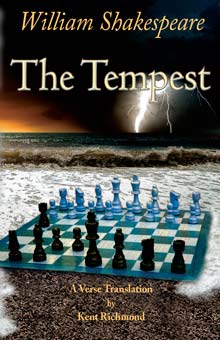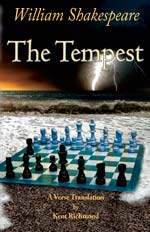


The Tempest A Verse Translation
William Shakespeare
Kent Richmond (translator)
ISBN-13 9780983637967
156 pages
Full Measure Press

The Tempest: A Verse Translation
William Shakespeare
Kent Richmond (translator)
ISBN-13 9780983637967
156 pages
Full Measure Press

Miranda and Ferdinand
"Be not afraid. The isle is full of noises,
Sounds, and sweet tunes that give delight
and hurt not"
A deposed duke and gifted magician named Prospero, his teenage daughter, a talented sprite, and a half-human monster live in exile on an enchanted island. Follow their adventures as Prospero engineers a plan to get back his dukedom and find a suitor for his daughter.
Enjoy The Tempest, Shakespeare's contribution to musical theatre, in a modern language version that recreates line-by-line the magic of Shakespeare’s verse. Your comprehension will increase, yet you will feel you are reading a work of literature, one with the complexity and richness of the original.
To keep the feel of Shakespeare, Kent Richmond's translation uses blank verse, prose, rhyme, or song whenever Shakespeare does. The language is more modern yet the size of the vocabulary matches Shakespeare’s original. You will soon forget that you are reading a translation.
Buy the Paperback at Amazon.com
Number of Unique Words in The Tempest
Shakespeare's original: 3,135
Richmond's translation: 3,276
Excerpt from The Tempest: A Verse Translation
from Act 3, Scene 2
CALIBAN
Are you afraid?
STEPHANO
No, monster, not I.
CALIBAN
Be not afraid. The isle is full of noises,
Read a longer excerpt:
Sounds, and sweet tunes that give delight and hurt not.
Sometimes a thousand strumming instruments
Will hum around my ears, and sometimes voices,
Though I have just awoken from long sleep,
Will make me sleep again, and in my dreams
The clouds will open up and drop on me
Such riches that when I awake, I cry
And beg to dream again.
STEPHANO
This is turning into a splendid kingdom, where music fills my court for free.
CALIBAN
When Prospero is destroyed.
Praise
"Too often, unless we read a Shakespeare play beforehand, we process the language as if it were coming from a poorly tuned-in radio station. Shakespeare didn’t write his plays to be experienced impressionistically as ‘poetry;’ he assumed his language was readily comprehensible. At what point does a stage of a language become so different from the modern one as to make translation necessary? Mr. Richmond is brave enough to assert that, for Shakespeare, that time has come. The French have Moliere, the Russians have Chekhov—and now, we can truly say that we have our Shakespeare.”
—John McWhorter, Manhattan Institute